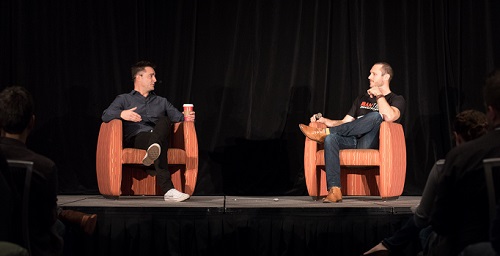
By Brian Scudamore, an EO Vancouver member and founder of O2E Brands
I am proof that you don’t necessarily need a suit to succeed: I didn’t finish high school, and after talking my way into university, dropped out with a semester to go. Most of what I’ve learned about business has come from starting 1-800-GOT-JUNK? in 1989, and building it from the ground up.
However, just because I didn’t complete a formal education doesn’t mean I stopped learning. Rather, I taught myself through trial and error, and more importantly, I asked experts for help. By talking to other entrepreneurs and accessing their knowledge, I found I could overcome learning curves faster – and more successfully – while creating a valuable network of mentors.
Over the years, I’ve grown my network to about 700 people – my “mentor board of advisors” or MBA. When I need guidance, I determine who’s successfully navigated similar situations within that group and make contact. A few years ago, I was focused on improving our corporate culture, so I flew down to meet with Zappos CEO Tony Hsieh. He gave me invaluable advice over lunch, and his expertise was a reminder to seek out expert advice – every time.
I believe with the right approach, anyone can get advice from the best in business.
PUT YOURSELF OUT THERE
Guess what? If you don’t ask, the answer is definitely no. Summon your courage, do your research, and put your question out there. Most people don’t mind being asked for help because it’s a chance to share their expertise in a certain subject matter. If you don’t hear back, ask one more time – entrepreneurs are usually busy people who may need a reminder.
Remember that your business heroes started at the beginning, too, and asking when they needed guidance is how they got to where they are today. The worst they can say is no, and if they turn you down, see it as an opportunity to find out who can help instead.
DO SOMETHING DIFFERENT
A few years ago, I cold-called Costco founder James Sinegal and I was shocked when he answered the phone himself. These days, phoning is also a retro way to stand out from email requests (Apple CEO Tim Cook gets around 800 daily emails), and much harder to ignore.
When you do get in touch, get to the point quickly. Show that you share a common interest and are genuinely interested in a mentor’s expertise. Sparking a real connection will increase the odds of a follow-up email or phone call.
BE SPECIFIC – AND BRIEF
Maybe you admire the time he righted the ship after profit losses, she modernized the brand, or they transformed their office culture – tell them why their expertise is imperative. Use specific examples to show you’re genuinely interested and you’ve done your research. Then describe the challenge you’re facing, and what you’d like to learn.
If you’re sending an email, bear in mind that an 8-second attention span is the new norm. By keeping your correspondence brief, you’ll have a better chance of getting a response from your expert of choice.
At the end of the day, it’s hard to quantify the benefits of mentorship (although some estimate it can increase revenue by 83%) but I think it is invaluable – I know that my business wouldn’t be half of what it is without these relationships.
Categories: Coaching Entrepreneurial Journey members Productivity
